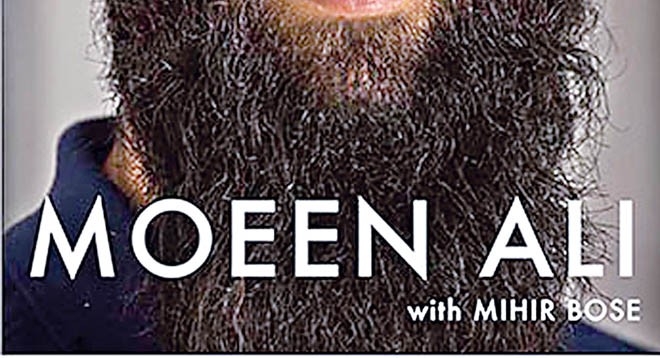
A lot of non-cricket issues are addressed as well, including Moeen’s version of why he wore a band to support Muslims’ struggle in Palestine; what happened when he confronted the player who called him ‘Osama’ during an Ashes Test; and why he is such good friends with spin twin Adil Rashid

English all-rounder Moeen Ali is one of the most interesting characters in World cricket, and that has nothing to do with his beard. But what led him to develop it, and what kind of racial comments he had to hear on the field because of it is explained in his autobiography Moeen, which is one hundred times better than the Game Changing one that was launched a few days back in Pakistan.
First and foremost, it seems like a book where the subject took interest and went through the text rather than apologising for the mistakes, and that’s what makes it an interesting read into the life of Moeen Ali, the person, the Muslim and the cricketer.
Moeen starts from the very beginning, about a lady named Betty Cox who was incidentally his grandmother. He explains that she married his grandfather when he was in England for greener pastures and she was a widow. He also talks about her decision to shift to Pakistan for her husband and kids which didn’t go well for an English woman who eventually returned to the UK and lived her life separated with her husband, but with her kids including Moeen’s father. That’s very important to know if you want to understand the ‘I Am A Quarter British’ comment because his dad is ‘Half White’. Well, this ‘Quarter British’ kid was treated no differently at school because he looked like his local friends and even met an accident because mistakenly, a car driver thought he was a gora coming out of the school!
He was born on a trolley as his parents reached the hospital late, that too with a police escort. After an azaan in his ears, his father gifted him a bat because, in his mind, he had calculated that his son would become a batsman when he grew up. Little did he know that the ‘Bazooka’ he wanted to bat was more inclined to fast bowling and finally settled as an off-spinner who could bat to make his dad proud.
Moeen accepts that he wasn’t an ideal student and was suspended from his school but that’s because he knew where he was headed. He asked his father for a couple of years to prove himself and despite accidents, injuries and unfavorable attitude of Warwickshire county and later Mark Greatbatch, the Cricket Academy Coach, he was able to make it into the English side due to his father’s sacrifices, his good luck and England’s lack of all-rounders.
In this well-written book, Moeen talks without defending his conduct or attacking his opponents. He is respectful to all, even to those who didn’t deserve respect.
He also unveils secrets to his success in the book – he discloses that it was Saeed Ajmal who taught him the doosra, that Kumar Dharmasena told him to grab his left pocket while delivering the ball for control, that Steve Rhodes made him feel important at Worcestershire and that Ray Walee became his spiritual guide.
He also talks about his family in detail: his parents, wife, siblings, and cousins, including fast bowler Kabir Ali, who represented England when Moeen was making a mark. It was his selection (and later sacking) that told Moeen that if he wanted to become part of the English team, he would have to work harder.
Trust me, you would love to know how he convinced the selectors to pick him for the national side in a 30-second interview, which led to a career he was hoping for.
Through this book you would know that when Moeen made his ODI debut against the West Indies, he was batting with a fractured thumb but the excitement of representing his country lessened the pain. His excitement on scoring a Test century in just his second match was equivalent to dismissing Kumar Sangakkara twice in as many matches and although they lost the match, Moeen Ali the all-rounder had arrived.
There is also some talk about how he wants to be a part of a World Cup winning squad for England; how he felt before and after becoming the first English spinner to have a Test hat-trick; what was going through his mind during the master-blaster century against the West Indies where he went from 39 to 100 in 14 balls with the help of eight sixes; and whom he doesn’t consider neutral commentators, because of their bias for players like him.
On the whole, Moeen is as wonderful as the cricketer it is based on, although your imagination will take a leave when you see the pictures of a cute young kid posing with his friends and family, and reading Moeen’s name in the caption.
A lot of non-cricket issues are addressed as well, including Moeen’s version of why he wore a band to support Muslims’ struggle in Palestine; what happened when he confronted the player who called him ‘Osama’ during an Ashes Test; and why he is such good friends with spin twin Adil Rashid.
Don’t miss the book, especially during the World Cup which England enter ranked No 1 in the world!
Renowned journalist Mihir Bose is the co-author of the book.